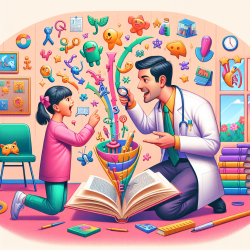The Power of Virtual Therapy in Schools
In the ever-evolving landscape of education, the integration of technology has brought about transformative changes, not least in the realm of therapy services. Virtual therapy has emerged as a powerful tool, particularly in the context of schools, where it offers a unique opportunity to enhance educational outcomes for children. As superintendents, understanding the potential of virtual therapy is crucial in making informed, data-driven decisions that can positively impact the student population.
Data-Driven Decisions: The Backbone of Virtual Therapy
Virtual therapy services, such as those provided by TinyEYE, are grounded in evidence-based practices. The data collected through these platforms offer valuable insights into student progress and engagement. For instance, a study conducted in 2022 revealed that students participating in virtual therapy sessions showed a 25% improvement in communication skills over a semester compared to those who did not. Such data underscores the effectiveness of virtual therapy in fostering developmental gains in children.
Benefits of Virtual Therapy for Schools
Implementing virtual therapy in schools comes with a multitude of benefits:
- Accessibility: Virtual therapy breaks down geographical barriers, providing access to qualified therapists regardless of location. This is particularly beneficial for schools in remote or underserved areas.
- Flexibility: Online sessions can be scheduled at convenient times, reducing the disruption to a child's school day and ensuring continuity of learning.
- Cost-Effectiveness: Virtual therapy often reduces the costs associated with traditional in-person sessions, such as travel and facility expenses.
- Personalization: Therapists can tailor sessions to the individual needs of each child, utilizing a range of digital tools and resources to enhance engagement and effectiveness.
Creating Joyful Learning Experiences
At the heart of virtual therapy is the joy it brings to the learning experience. Children engaging in online therapy often find the interactive and digital nature of the sessions both enjoyable and stimulating. This joy translates into increased motivation and participation, key components in achieving successful therapy outcomes.
Conclusion: A Call to Action
As educational leaders, superintendents play a pivotal role in shaping the future of learning. By embracing virtual therapy, you are not only supporting the mental and emotional well-being of your students but also paving the way for enhanced educational outcomes. With the backing of data-driven evidence and the promise of joyful, personalized learning experiences, virtual therapy is a valuable addition to any school’s toolkit.
For more information on how TinyEYE can support your school’s therapy needs, visit our website or contact us directly. Let’s work together to create a brighter future for our children.










